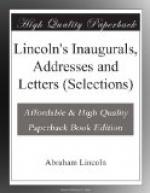Upon military necessity. This phrase was inserted in the concluding sentence, which had been suggested by Secretary Chase, as furnishing the only authority by which the President felt that he could free the slaves of the enemy. The Proclamation did not refer to those slaves held by persons who were not in rebellion.
LETTER TO J. C. CONKLING.
Mr. Conkling was a personal friend of the President, and the formal letter was accompanied by the following note:
“MY DEAR CONKLING:
“I cannot leave here now. Herewith is a letter instead. You are one of the best public readers. I have but one request—read it very slowly and now God bless you, and all good Union men.”
In spite of precautions, the letter was published in the New York Evening Post several days before the meeting.
I know as fully as one can know. The portion of the paragraph from these words to the end was not in the original letter, but was added by telegraph.
THE GETTYSBURG ADDRESS.
The standard text of the address does not agree exactly either with the original written form or with the form in which it was delivered, but it is a combination of these, made by Lincoln a few days later. In the contemporary newspaper reports it was variously referred to as an address, a speech, and remarks.
Government of the people. The thought contained in this sentence was not original with Lincoln, but it has been traced back through several centuries. It was probably suggested to Lincoln by the following passage in an address by Theodore Parker, which he is known to have read: “Democracy is direct self-government over all the people, for all the people, by all the people.”
THE SECOND INAUGURAL ADDRESS.
This address is in marked contrast, both in length and character, to President Lincoln’s first official communication. Some of the main thoughts and two of the Biblical quotations occur in a letter written May 30, 1864.
Let us judge not, that we be not judged. Adapted from Matthew vii. 1.
“Woe unto the world.” Matthew xviii. 7.
Fondly do we hope. The accidental rhyme in this passage is the only blemish that has been objected to in the address, and it is not serious.
“The judgments of the Lord.” Psalms xix. 9. The opening words of the last paragraph are the best expression ever given of the spirit of Lincoln, who on another occasion said, “I have never willingly planted a thorn in any man’s bosom.”




